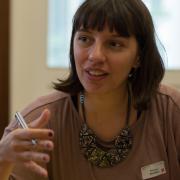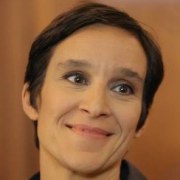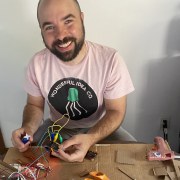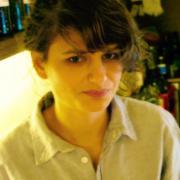‘In conversation… MakerSpaces, featuring science capital’
“Welcome to today’s edition of ‘In conversation...’
Thank you for that science capital introduction and now let’s welcome our illustrious guests with experience of successful MakerSpaces in their institutions. They say that their activities foster learning, and support interaction, and are popular with young people. They say they are equitable places, open to anyone. But how can they be so sure? Building on insights from science capital research we will make them THINK about the ways science capital can challenge what they do in these spaces.
Fielding questions from our intrepid interviewer Dr Jen DeWitt are leading lights from science centres from across the globe! These three guests will use their experience running maker spaces to answer her questions.
And finally, as usual on this show, we expect a spirited contribution from the audience as they share their views on inclusive MakerSpace practice and reflect on implications.”
Facilitator
Research Associate, King's College London
Session speakers
IOE (UCL's Faculty of Education & Society)
Jen will act as ‘host’ for the show, drawing on her research on science capital and on learning in informal settings to provoke the ‘guests’ to think about how their spaces support (or not) engagement among diverse visitors. Her questions will also encourage them to consider what changes they might make to be more inclusive. Finally, she will moderate the conversation between the guests and the ‘studio audience’ around what taking a science capital perspective might bring to Maker spaces.
Director of Education and of the Centre of Research in Informal Learning
The Tinkering Zone includes one part dedicated to Tinkering activities and another dedicated to Making. These two parts are connected but separate, with a central aim of encouraging a tinkerers’ disposition. This means that our Maker space has the primary goal of opening up the Maker’s philosophy, tools, and products to anybody, especially to those who know nothing about it. Making becomes a resource for learning and not an activity in its own right. Do we succeed?
Freiburg im Breisgau
Germany
In the Tinkering Studio, visitors can slow down, become deeply engaged in an investigation, and make something. A range of opportunities are available, collaboration is encouraged and a large, eclectic assortment of materials, tools, and technologies are provided for people to use as they explore and create. But as we design activities, environments, and facilitation, how can we be sure to be welcoming and accessible to all visitors with diverse backgrounds, interests and experience levels?
At the workshop tables of the Thinkatorium, visitors face engineering, scientific and logical challenges with only everyday items (straws, paperclips, rubber bands) at their disposal. It is a place, where all visitors, regardless of age, knowledge or skills, can learn that they "think better than they think". But, is this really the case for everyone? Our study explored whether there was a relationship between science capital and the way children experienced the tasks.





